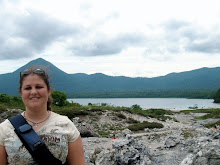I faltered in delivering you a first hand reaction devoid of other's opinions on God in America, but schoolwork prevented me from finishing the whole series right away. But now that it is done, and its been a week to soak in, this is my reaction to PBS's God in America.
About six months ago I religiously (no pun intended) watched the other popular American based historical documentary: History Channel's America, The Story of Us. I bring this up because God in America seemed like another focus on the same style of documentary. Now, I have read some reviews that complain that God in America didn't follow more non-Protestants, non-whites, non-males, ect, ect. Yes, I noticed. But I honestly wasn't surprised about that. Not at all. I'm not saying its excusable, but it is understandable. I understand what God in America was trying to do: begin (keyword) to educate the non-academic public about American religion, its roots, and to focus on key events on its development up to here. Finally to squeeze it in to 6 hours (which was so long and even I couldn't do straight through as facinated as I was with both this series and Ken Burn's the 10th Inning-- and I even participated in the live blogging for awhile ). I get all that and thus I'm not going to critique it. The America, the Story of Us series was structured the same way: all of American history in a short go. My small critique has to do with an amusingly American element of both series: the focus on the individual.
Both the America, the Story of Us and the God in America series decided to follow the flow of history through focusing on one individual at a time, and for some reason that bothered me both times. Key players who made key strides in American religion, a continuation of the American history education we all enjoyed that focuses on individual acheivement and says, "This can be you! You could change history one day!" While I appriciate the encouragement, the fact of the matter is, history is not one individual's actions followed by another in a linear sequence, but a culmination of individual actions forming a network of actions and happenings both big and small to create a collective force that pushes history forward. Even when one person seems like a catalyst, he or she is just one knot in the net and even the cause of that important individual be it Lincoln, Jefferson, MLK, or even Jerry Falwell, is influenced by a culmination of other factors. While these figures are important and I can see why focusing on important individuals is of interest holding value for both PBS and the History channel. I would like to see a version of history that focuses not on individuals by on social movements, of groups of individuals who created events, of the people behind the famous historical figures. Part of me accepts though that this may never happen, as how can one person speak about the opinion or even generalize about a group of individuals when there is so much to be said about a historically "important" key figure. I would just like to hear more about a little people's God in America: a history that moves away from the shining light of the famous historical figure and tracks history that didn't happen in the spotlight. The God in the American margins. Like I said, I get why they did it this way and I appriciate the existance of God in America because religious literacy of *any* kind is important, but I guess I'm just looking for the alternative history.
Other critiques of God in America:
Who's God in America? - Marian Ronan
The Brutality of American Eden- Paul Harvey
Religion Profs Critique PBS' God Documentary: Call it Simplistic - Matthew Avery Sutton
Subscribe to:
Post Comments (Atom)




No comments:
Post a Comment